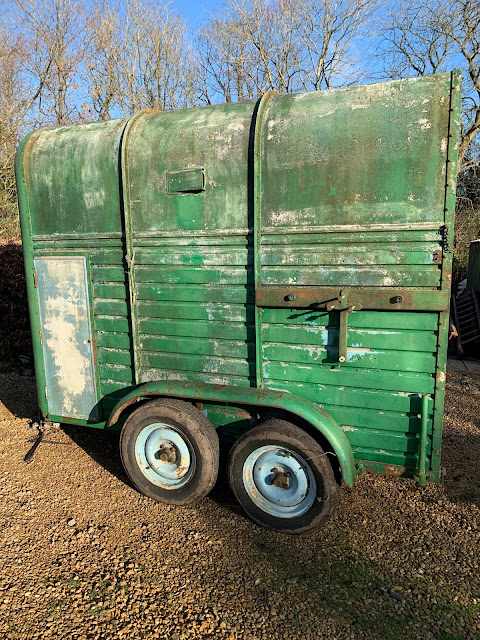Cute.
The pigs are Large Blacks, sometimes called Cornish Blacks, and are the most endangered British native breed. The Large Black was the most numerous and popular pig on British farms and in most other countries too until it fell from favour after the second world war when the modern hybrid white pig took over, with its lean long body. Nowadays people think that black pigs produce black crackling, but they do of course emerge from the abbatior with normal pink pig skin, no black crackling, thank goodness!
Raising pigs though can be quite an expensive business. To start with a rare breed weaner ready to leave it's mother at around 8 weeks old, will cost from around £35 to £65, depending on whether it's registered with the breed society or not, and as registering costs, mine aren't, but are still good pigs from pedigree parents. Then at the other end of the procedure there is the abbatior and butchering costs, I'm expecting to pay around £50 to £60 per pig, plus the cost of getting them there which entails hiring a trailer as I don't have my own. But the major cost of raising the pig is the cost of feeding. I can buy pig feed from my local feed mill in 20Kilo bags, and if I fed my pigs on this alone, depending on how long it takes to raise them to a good weight, I could easily spend a hundred pounds on feeding each pig.
So, this being the case I've been on the lookout for alternative food sources. and it isn't easy these
days because most traditional ways of feeding pigs have become illegal, and those that aren't illegal have fallen into disuse. Pigs are omnivores, and will eat a wide variety of foodstuffs. That's not to say that they should ever be given rubbish, and if you feed your animals rubbish, you will get rubbish as an end product. But vast amounts of perfectly usable food which could be fed to pigs is thrown away and goes into landfill every year. After the last outbreak of Foot and Mouth disease, it is now
illegal to feed pigs anything which has been inside a domestic or commercial kitchen, so called post consumer food, but it's fine to give them waste fruit and veg and bread, and crops from the field.
So with this information at the front of my mind I went to see my local shopkeepers to see what I could find. Needless to say the big supermarkets were less than helpful. Not the local managers and staff who were all sympathetic to my ideas, and one assistant even said he had asked if waste flowers could be sent to the local old people's home but even this was refused! They had all been instructed
from head office that waste food could not be sent anywhere other than landfill and the reasoning was that someone might eat it and be poisoned, and then sue them! First of all, if the food is good enough for people to eat they should be selling it to people, and it it's not, then why not let pigs make use of it?
My local greengrocer on the other hand keeps a
designated bin at each of his shops where spoiled produce is stored until either I or another pig keeper comes along to take it away. And my local mini supermarket keeps the stale bread for me to collect when it's past it's sell by date. the pigs love it and seem to be thriving on it, but I just wonder if I can get a relatively large amount of waste from just a few local shops, how much must the big supermarkets be throwing away every week or every year? Stuff that must cost them money to dispose of, and could be turned into delicious pork chops! And remember of course that anything that costs supermarkets money will be charged to consumers in the end. And no one has been poisoned from attempting to eat stale bread or black bananas from my local shops so why can't mr Tesco do the same? Could it be because they don't want anyone to know just how much food they waste? could it be that they would rather ship it all off on the quiet to landfill and hope that it will be out of sight and out of mind for the rest of us. Read more about this on the Pig Idea.
Anyway, I've also found some other generous suppliers of waste products that pigs just love. Today I picked up half a dozen sacks of spent grain from a local brewery. And I've been collecting apple pomace from Brendon Community Orchard who produce delicious local apple juice and provide a great community facility. And lastly, we live on the edge of the Nettlecombe Estate, which is famous for it's wonderful oak trees. A local man collects acorns every year from the mighty Nettlecombe oaks, Quercus Petraea, and supplies them to commercial growers. Luckily for me he only needs the biggest and best acorns, and the rest - small, damaged, or wormy ones are available for me, or rather my pigs. It's a bit backbreaking gathering them all up, but I'm sure the girls appreciate my efforts - here they are tucking into the latest sackfull
You can see from the pictures that the pigs make quite a good job of digging up the field!








So wonderful to find a post from you, it has been some time. Pigs are a new adventure for you are they not?
ReplyDelete